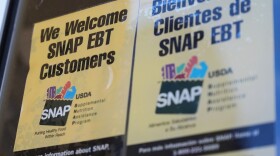-
State lawmakers are confronting the possibility of new major costs tied to SNAP benefits.This comes as new federal requirements under the One Big Beautiful Bill Act are shifting administrative costs to states.The move forces Alabama to cover roughly 39-million-dollars.Beginning next year, the state could also face up to 200-million-dollars in addition expenses tied to payment error rates.
-
With the longest U.S. government shutdown over, state officials said Thursday that they are working quickly to get full SNAP food benefits to millions of people who made do with little-to-no assistance for the past couple of weeks. Until recently, SNAP families and food banks in Alabama will have to subsist with pledges of emergency funding from Governor Kay Ivey and The State Department of Human Resources.
-
The government shutdown is triggering a wave of closures of Head Start centers, leaving working parents scrambling for child care and shutting some of the nation's neediest children out of preschool. The impact may include head start centers in Alabama.
-
It wasn’t immediately clear how quickly the debit cards that beneficiaries use to buy groceries could be reloaded after twin rulings by federal judges. That process often takes one to two weeks. The website USAfacts says 750,000 Alabamians use SNAP dollars to afford enough to eat.
-
Two federal judges ruled nearly simultaneously on Friday that President Donald Trump’s administration must to continue to fund SNAP, the nation’s biggest food aid program, using contingency funds during the government shutdown. An estimated 750,000 Alabamians depend on SNAP benefits to eat.
-
A federal judge in Boston on Thursday seemed skeptical of the Trump's administration's argument that SNAP benefits could be suspended for the first time in the food aid program's history because of the government shutdown. The website USA Facts says 750,000 Alabamians use SNAP benefits to buy groceries.
-
Alabama residents who depend on SNAP benefits for groceries are facing what could be a tough November. State officials say there will be no food stamp dollars next month, and it’s not just hungry families who may be hit. Eighteen rural Alabama counties are reportedly at risk of losing grocery stores if SNAP benefits are cut. The Center for American Progress used data from the USDA for its findings with Dallas and Wilcox counties at the top of the list.
-
The Alabama Department of Human Resources confirmed that recipients of the Supplemental Nutrition Assistance Program, also known as SNAP or Food Stamps will not receive aid during the month of November. Federal funding for the benefits was anticipated to end on Saturday due to the ongoing federal budget shutdown. The website USA Facts says over 750,000 Alabamians use SNAP to ensure they have enough to eat.
-
Officials in Louisiana, Vermont and Virginia pledged this week to keep food aid flowing to recipients in their states, even if the federal program is stalled next month because of the government shutdown. Alabama’s plans, if any, remain under wraps with the November first deadline looming for an end to federal money. The state is not responding to questions from the press about what happens this coming Saturday.
-
For the almost two million Alabamians grocery store shelves loaded with fresh fruits and vegetables are often out of reach. That’s because they live in what are called food deserts. Those are rural and urban settings where poverty is higher, education is lower, and supermarkets are often non-existent. That leaves so called “dollar stores” as the only grocery option for a growing number of Alabamians facing food insecurity. Last week, we reported on what changes to food stamps might mean for Alabama’s hungriest residents. Today she teams up with a local chef to better understand the challenges of Alabamians living in food deserts.
Play Live Radio
Next Up:
0:00
0:00
Available On Air Stations










